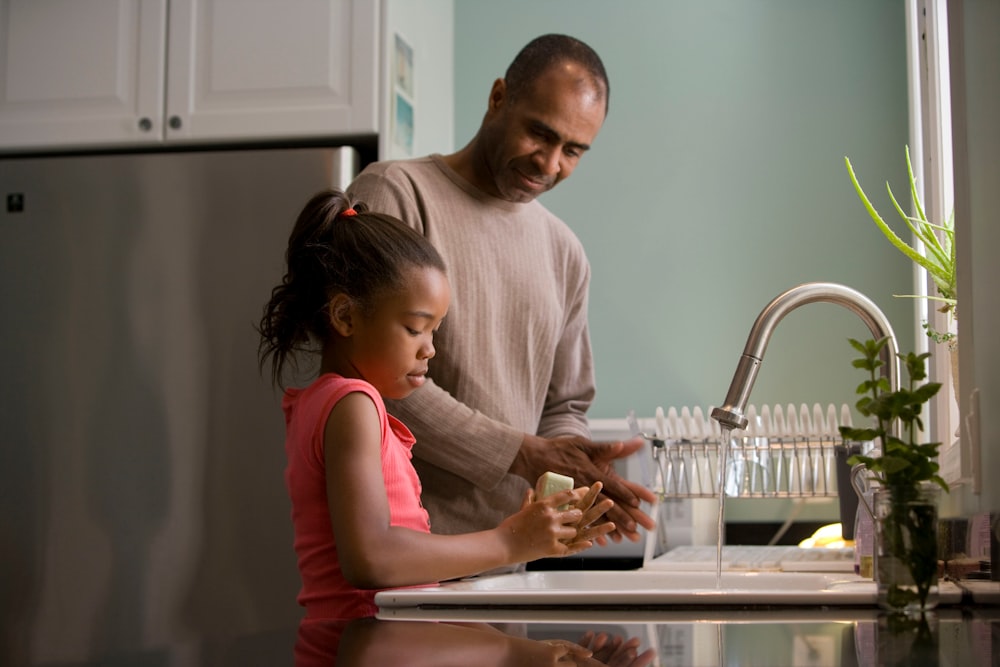Cover photo by Megan Markham from Pexels
Written by Kylee Marshall, Licensed Associate Marriage and Family Therapist
Let’s reflect on the week, shall we? How many comments have you heard this week moralizing food? (“I’m so good, I just ate half of my meal.” “Ugh, I’m so bad for eating this, but it’s so good.” “Cheat day!”) How many comments have you heard this week about weight loss? How many comments have you heard about hunger/fullness (“I’m so hungry, I haven’t eaten all day.” “I ate way too much.” “I can’t believe she ate all that.”) If you’re like me, I often found myself surrounded by comments about body and food that I didn’t like, and at times even participating myself. What if I told you it didn’t have to be this way? What if I told you that research actually promotes a different, more peaceful way of relating to yourself and your food choices? In this article I’m going to share a few principles that will help you find more food and body freedom.
Your Body Isn’t the Problem.
So often people that have a rocky relationship with food and body work tirelessly to fix this by changing their bodies. People spend precious time, money, and mental/physical energy into shrinking, toning, morphing, shaping, etc. their bodies into something else. This makes sense; most people do this because they want to fit in and feel like they belong. Adjusting their body seems like it would be a way to get to this goal. However, not only is this not a very helpful goal in terms of getting to a place of peace with food and body, but changing one’s body doesn’t need to be the goal at all. This might sound too good to be true, but what if your body isn’t the problem? What if the way you THINK about your body is the problem? Stick with me here.

Many people hope that if they lose weight, their negative body image will be lost with it. However, studies on weight loss and mental health have concluded that calorie restriction can lead to unplanned side-effects that are damaging to mental health, such as mood swings, increase in preoccupation with food and hunger, anxiety, social isolation, and emotional deadening (Dirks & Leeuwenburgh, 2006; Stice, Burger, & Yokum, 2013). Even those who participated in plastic surgery as an unrealistic method of feeling better about themselves often fared worse in the long run (Honigman, Phillips, & Castle, 2004).

Instead of focusing on changing our bodies, it might be more important for us to work on our mental health. Eating disorders are highly correlated with mental health disorders. In fact, some studies show that as many as 97% of individuals with severe eating disorders have one or more co-occurring mental health conditions and around 66% of people with anorexia showed signs of anxiety several years before the start of their eating disorder (Tagay et al., 2014). Spending time with some of the mental health difficulties, emotional pain, and cognitive distortions that have contributed to the development of eating disorders and disordered eating patterns will be significantly more helpful for overall well-being than simply changing our bodies.
I would argue that losing weight or changing our bodies is our way of attempting to fix deeper issues such as a desire to fit in, be accepted and loved, and to feel good enough. However, I would suggest that we need less fixing and more healing. We don’t need to fix ourselves or our bodies, we need to heal our relationship with ourselves and our bodies. This is not always a quick fix, but the results and peace are much more long-lasting.

Learn to Reconnect with Your OWN Body.
Have you watched a toddler eat? It is so fun to watch littles be presented with many options and move through them eating what tastes good at the time. They typically finish eating when full and do not know principles of restriction, so simply eat what their body is asking for. We are all born intuitive eaters! As we age, we disconnect more and more from our bodies as we learn what we “should” and “shouldn’t” take into our bodies, what food is “good” or “bad” and learn rules about when to eat, how much to eat, etc. In my field as an eating disorder therapist, I see so many people who are looking to outside sources for how to control their bodies better. However, I would make a radical suggestion that our bodies are wise and we can trust them. It is the factors in society that have disconnected us from our bodies that we need to combat! From toddlerhood to old age, our bodies have built in systems to help us feel our hunger and fullness, ask for nutritious food that we need, and move in ways that feel beneficial and energizing.

Becoming the expert on your own body means taking time to get to know and understand it. Dieting is unhelpful in this process because it moves you away from connection and towards an arbitrary set of rules. Research has found that 95% of dieters will regain their lost weight within five years (Grodstein et al., 1996; Neumark-Sztainer, Haines, Wall, & Eisenberg, 2007). There are many potential reasons as to why this is. One might be that our body fights hard to keep us safe and healthy, meaning that it is hard to ignore and pacify our body’s natural signals for more than a short period of time.
Instead of viewing your body as something to control and fix, try approaching your body and its signals with curiosity. My husband and I just had a conversation as I was writing this article about our day old Chip cookies on that counter. We talked about how sometimes we would walk by and eat a piece of cookie even though they were stale and hard just because they were there. This is a conditioned response to want cookies because they’re a “yummy treat” even though in that moment they were not so tasty. We can use this experience as information when making food-related decisions moving forward. I’ve also been on the opposite side of the spectrum, wanting to eat cookies but being governed by the idea that cookies are “bad,” and then getting very psychologically wrapped up in the cookie! Instead, if my body is asking for a cookie, perhaps I eat the cookie and move on. If my body is not asking for the stale, hard cookie on the counter, I can practice mindfulness and tap into my body’s signals and leave the cookie in its box. It’s not about food rules or dieting here, it’s about listening to my body and trusting what it is saying.

All Foods Fit!
As you begin the journey of listening to your body, try adopting the mindset of “all foods fit.” All foods can be enjoyed when our bodies ask for them! Food is neutral and has no moral value and so we don’t need to avoid it unless it is actually harmful for our bodies because of disease or allergy. If we purposefully cut out or restrict certain types of food, our bodies and minds go into deprivation mode and the scarcity mentality kicks in, leaving us wanting those foods even more! This is why dieters are 12 times more likely to binge than non-dieters (Neumark-Sztainer, 2005). When we allow all foods to be a part of our daily eating patterns we are able to better tap into our body’s signals, free of shame. In fact, being more intuitive and allowing all foods to fit actually has been linked to less disordered eating, better body image, and greater emotional functioning (Bruce & Ricciardelli, 2016). What does it look like for all foods to fit for you? What foods do you have rules around? How can you listen to your body as you allow them to more fully “fit” into your lifestyle?

Conclusions + Application.
Woah, this is a lot of information! You might feel like you’re unsure how to apply some of these ideas. Start now by becoming the expert on your own body/food through one of the following:
-
If your eating patterns are disordered or you recognize eating disorder symptoms in your own life, seek some outside professional help. These issues are really painful and often difficult (and potentially dangerous) to manage on your own. You are not alone. Find a therapist trained in eating disorders and reach out for one-on-one assistance A helpful website to find those who are best suited to help with your specific case is PsychologyToday.com. Feel free to reach out to me directly as well and I’ll do my best to get you connected to the resources you need.
-
Allow all food to fit this week. Listen to your body. Does a burger sound good? Let’s do it. Are you feeling salad for lunch? Fabulous. Does pasta sound like it’ll really hit the spot? Let it hit the spot. Notice what your body asks for and honor it! Take note of how your body responds and what it asks for as your own personal research for becoming more in-tune with your body and its signals. Begin breaking away from the scarcity mentality. Let your body be the guide. Eat like a toddler this week.
-
Read Intuitive Eating by Elyse Resch and Evelyn Tribole or More Than a Body by Lexie Kite and Lindsay Kite
-
Pay attention to your thought patterns. Recognize and question your unhelpful thoughts about food and your body. Where did those thoughts come from? Are they true? Do they fit with your value system? Do they help promote your becoming the expert on your own body? Be mindful and remember that your thoughts are not always true!
-
Open up with someone you love about struggles you may have in these areas. See if you can work together to better your relationships with food and body.
-
Unfollow accounts on social media who do not promote healthy relationships with food and body; follow accounts who do. Here are some suggestions:
-
-
@diet.culture.rebel
-
@no.food.rules
-
@evelyntribole
-
@chr1styharrison
-
@balancehealthandhealing
-
@beauty_redefined
-
 Choose one of the above applications to begin becoming an expert on your own body and developing a healthier relationship with food!
Choose one of the above applications to begin becoming an expert on your own body and developing a healthier relationship with food!
References
Tribole, E., & Resch, E. (2012). Intuitive eating. New York: St. Martin’s Griffin.
Kite, L., & Kite, L. (2021). More than a body: Your body is an instrument, not an ornament.
Tagay, S., Schlottbohm, E., Reyes-Rodriguez, M. L., Repic, N., & Senf, W. (2014). Eating disorders, trauma, PTSD, and psychosocial resources. Eating disorders, 22(1), 33-49.
Neumark-Sztainer, D. (2005). I’m, Like, SO Fat!.New York: Guilford.
Dirks AJ, Leeuwenburgh C. Caloric restriction in humans: potential pitfalls and health concerns. Mechanisms of ageing and development. 2006 Jan 1;127(1):1-7.
Stice, E., Burger, K., & Yokum, S. (2013). Caloric deprivation increases responsivity of attention and reward brain regions to intake, anticipated intake, and images of palatable foods. Neuroimage, 67, 322-330.
Honigman, Roberta J. B.Comm., B.Soc.Work., A.A.S.W.; Phillips, Katharine A. M.D.; Castle, David J. M.Sc., M.D., M.R.C.Psych., F.R.A.N..C.P.
Plastic and Reconstructive Surgery: April 1, 2004 – Volume 113 – Issue 4 – p 1229-1237 https://doi.org/10.1097/01.PRS.0000110214.88868.CA
Grodstein, F., Levine, R., Spencer, T., Colditz, G. A., &Stampfer, M. J. (1996). Three-year follow-up of participants in a commercial weight loss program: Can you keep it off? Archives of Internal Medicine 156(12), 1302.
Neumark-Sztainer D., Haines, J., Wall, M., & Eisenberg, M. ( 2007). Why does dieting predict weight gain in adolescents? Findings from project EAT-II: a 5-year longitudinal study. Journal of the American Dietetic Association, 107(3), 448-55


 Kylee Marshall is a licensed associate marriage and family therapist at Balance Health and Healing in Lindon, UT where she primarily sees clients who struggle with eating disorders, body image issues, anxiety, relationships issues, and depression. She is also an adjunct faculty instructor at Brigham Young University in the School of Family Life. She was married last week and is enjoying life with her husband and mini-golden doodle pup, Frodo. She is passionate about floral and home design, ice cream, hand-lettering, lifting weights, social justice, acai bowls, and promotes healthy relationships with others, yourself, food, and body. She could also probably make you the world’s best chocolate chip cookie.
Kylee Marshall is a licensed associate marriage and family therapist at Balance Health and Healing in Lindon, UT where she primarily sees clients who struggle with eating disorders, body image issues, anxiety, relationships issues, and depression. She is also an adjunct faculty instructor at Brigham Young University in the School of Family Life. She was married last week and is enjoying life with her husband and mini-golden doodle pup, Frodo. She is passionate about floral and home design, ice cream, hand-lettering, lifting weights, social justice, acai bowls, and promotes healthy relationships with others, yourself, food, and body. She could also probably make you the world’s best chocolate chip cookie. 




 Identify a form of self-care that nourishes, restores, and connects you, and implement that practice into your week.
Identify a form of self-care that nourishes, restores, and connects you, and implement that practice into your week. Rachael Porter is from Saratoga Springs, Utah. Rachael is currently a Family Life major with a minor in gerontology at BYU. She is the oldest of four kids and is married to her best friend Matt. She works as a TA for online family life classes at BYU. Rachael looks forward to graduating in December 2020 and having children afterward. She enjoys ice cream, traveling, friends, hiking, camping, plants, and movie nights.
Rachael Porter is from Saratoga Springs, Utah. Rachael is currently a Family Life major with a minor in gerontology at BYU. She is the oldest of four kids and is married to her best friend Matt. She works as a TA for online family life classes at BYU. Rachael looks forward to graduating in December 2020 and having children afterward. She enjoys ice cream, traveling, friends, hiking, camping, plants, and movie nights.














